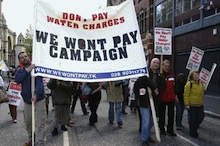
The coalition government’s plans for the introduction of new water taxes has generated a new wave of resentment at the financial pressures being imposed on people in the 26 Counties.
Support for the government has plunged by fourteen points to 23% as a result of the government’s latest and most unfair austerity tax.
The water tax system was originally agreed as part of the coalition’s programme for government on foot of demands by the ‘Troika’ of the International Monetary Fund, the EU and the European Central Bank.
Taoiseach Enda Kenny and government officials made a series of contradictory statements this week on their intentions for the new charges. Officials caused outrage on Tuesday when they said they planned to extract the initial cost of the installation of the new water meters through a one-off charge amounting to several hundred euros.
While that idea now appears to be off the agenda, the current plan -- to impose a 40 euro a month standing charge for twenty years on every home linked to the public water supply in the country -- has been greeted with equal disgust.
Confusion continues to reign over what the final cost to the public of the actual water will be, with government officials refusing to divulge their plans. There has also been a refusal to say how much water, if any, will be delivered free before the metered costs are figured in.
Minister for the Environment Phil Hogan said the government had decided on Tuesday that responsibility for the public water supply should be transferred from local councils to Bord Gais [the Irish Gas Board] as ‘Irish Water’, an independent State-owned subsidiary.
He claimed the establishment of Irish Water was a “historic” development to compare with the setting up of the ESB (Electricity Supply Board). Almost two million high-tech water meters are to be installed by the end of 2014 at the cost of 800 euros ($1,040) per home, he said.
Suppliers of water meters have expressed surprise that the cost of installing water meters across the 26 Counties could be anywhere close to that amount, as the hardware required for the installation can normally be purchased for less than 100 euro.
Adding to public concern, Taoiseach Enda Kenny suggested that householders would lose their water supply if they failed to pay the proposed charges. He said the plan was still being worked on, but added: “If you don’t pay your electricity bill, if you don’t pay your telephone bill, it is cut off.”
The charge is the government’s latest and most blatant attempt to spread the cost of Ireland’s banking system bailout and budget deficit to all members of society in the 26 Counties, regardless of means. It has been vociferously denounced by all of the opposition parties in the Dublin parliament as well as by voluntary and community organisations.
Sinn Féin leader Gerry Adams described the new charges as “unacceptable”. It was “another burden on working people” and on those who can ill-afford yet more punitive charges, he said.
“It is clear that Fine Gael is setting the agenda on water services while the Labour Party is willingly falling into line,” he said.
He called on the government to invest the money being spent on water meters on upgrading the state’s aging and leaking water distribution system.
“Sinn Féin and other parties have made submissions to what was to be a public consultation on the reform of the water sector in Ireland. That process has not even concluded, but the government has clearly made decisions on the issue, ignoring the democratic process.”
There was also strong concern about the likely future privatisation of basic water supply in Ireland. Last February, Bord Gais was earmarked for full or partial privatisation, and the government’s decision to place the new water authority under its control appears designed to make the semi-state more attractive to international buyers.
Mr Adams said he believed the establishment of Irish Water was paving the way for a sell-off.
“Fine Gael and Labour are ideologically committed to privatisation and we believe that proposals to establish one organisation: Irish Water, is laying the foundation for this,” he said.
It was also seen as no coincidence that the announcement of the water tax took place on the same day as economic managers from the ‘Troika’ were carrying out an audit on the state’s ability to repay last year’s 85bn euro bailout loan.
Eirigi councillor Louise Minihan said the “neo-liberal” policies of the Troika demanded the eventual privatisation of virtually all public services, including water services.
She called on people to resist the introduction of domestic water taxes because water should be considered “a fundamental right which the state has a duty to provide for all citizens”.
“It represents a form of double taxation; the people of this state already pay for their water through central taxation... It is being introduced as part of an austerity programme which will see tens of billions of public euros transferred into private hands.”
She said attempt to introduce a domestic water tax must be met with a mass campaign of non-payment and civil disobedience, similar to that which is currently underway in relation to the property charge.
“If sufficient numbers of people simply refuse to pay these unjust taxes the government will eventually get the message - the people can’t and won’t pay for the greed of your banker and property developer buddies!”
![[Irish Republican News]](https://republican-news.org/graphics/title_gifs/rn.gif)
![[Irish Republican News]](https://republican-news.org/graphics/title_gifs/harp.gif)

